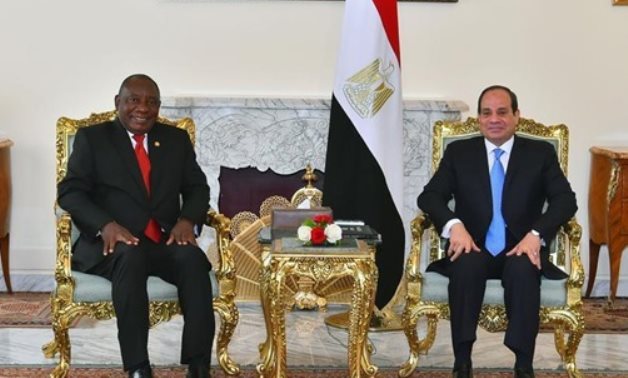
FILE - President Abdel Fatah al-Sisi received his South African counterpart Cyril Ramaphosa in Ittihadiya presidential palace. December 12, 2019. Press Photo
CAIRO - 17 July 2020: Reaching a comprehensive and legal agreement between Egypt, Sudan and Ethiopia over the controversial Grand Ethiopian Renaissance Dam (GERD) is inevitable, said President Abde Fattah El Sisi in a phone call with his South African counterpart Cyril Ramaphosa, which chairs the African Union (AU) this year.
“President [Sisi] reaffirmed, during the phone call, Egypt’s stance which based on the principle that Nile water represents an existential issue for the Egyptians, and then reaching a comprehensive legal agreement between all parties on the rules for filling and operating the dam is imperative,” said Egyptian Presidential Spokesperson Bassam Radi in a statement on Friday.
President Sisi voiced his rejection of any unilateral measures that would harm Egypt's water rights, expressing his appreciation for President Ramaphosa’s efforts in this regard.
The South African President praised Egypt’s way in dealing with the dam issues during the negotiations, which have been brokered by the Afican Union.
The phone call between both leaders came two days ago after publishing perplexing media reports saying that Ethiopia started filling the dam’s reservoir, without reaching a final agreement between Ethiopia and the downstream countries [Egypt and Sudan].
On Wednesday, the Ethiopian Broadcasting Corporation (EBC), the state-owned TV, reported that Minister of Water, Irrigation and Energy Seleshi Bekele announced the start of filling the dam with 4.9 billion cubic meters of water within the first stage of the filling process. However, the EBC apologized for “misinterpreting” this news.
One day later, Ethiopian Ministry of Water Resources and Irrigation denied such reports, announced the Sudanese Ministry of Foreign Affairs on Thursday.
"The Ethiopian Charge D’affaire in Sudan affirmed that his country did not start filling the dam’s reservoir, noting that due to the heavy rainfall, plenty of water accumulated naturally near the dam’s reservoir," the Sudanese statement said.
The AU brokered a 11-day round of negotiations between the three countries to reach an final agreement on technical and legal points of contentions. However, the discussions reached another stalemate.
Egypt previously decided to request the United Nations Security Council’s intervention in the dispute on Ethiopia’s massive dam, after Egypt had said several times that the two countries have reached a deadlock. In addition to this, the United States and the World Bank (WB) brokered other previous rounds of negotiations over the period of time between November 2019 to February 2020; the negotiations also reached a deadlock.
Since 2014, Egypt, Ethiopia, and Sudan have entered into negotiations on the building of the dam to avoid any possible threats on the Nile downstream countries. The latest round of talks, which convened early June, reached a stalemate, ahead of the Ethiopian unilateral act of deciding to fill the dam’s reservoir mid-July without reaching a final agreement with Egypt and Sudan.
The conflict between Egypt, Sudan, and Ethiopia dates back to May 2011 when Ethiopia started building the dam; Egypt voiced concern over its water share [55.5 billion cubic meters]. Three years later, a series of tripartite talks between the two countries along with Sudan began to reach an agreement while Ethiopia continued the dam construction.
In 2015, the three countries signed the Declaration of Principles, per which the downstream countries should not be negatively affected by the construction of the dam.
In October 2019, Egypt blamed Addis Ababa for hindering a final agreement over a technical problem, calling for activating Article No. 10 of the Declaration of Principles, which stipulates that if the three countries could not find a solution to these disputes, they have to ask for mediation.
Comments
Leave a Comment